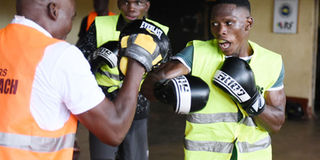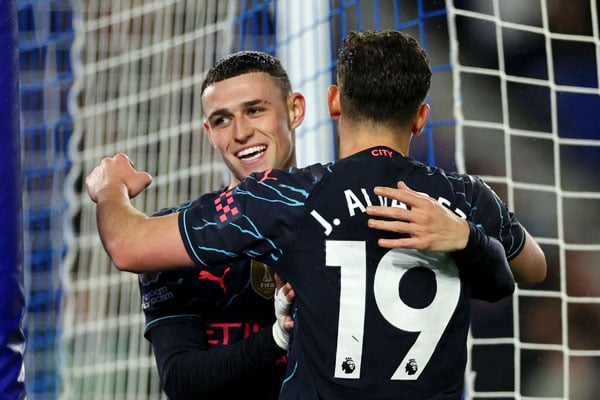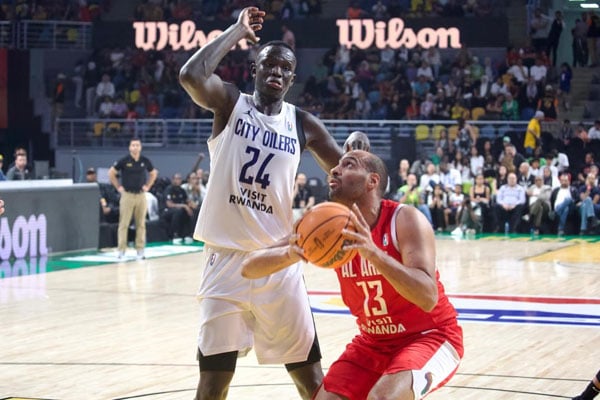Finding positives

What Next? Endless questions will continue to linger in the aftermath of the Tokyo 2020 Olympics postponement due to the Coronavirus pandemic. Bombers captain Shadir Musa Bwogi (L) had already qualified for the Games but what waits to be seen is if the authorities will put in place another build-up tournament or a fresh qualification campaign. PHOTO BY ISMAIL KEZAALA
What you need to know:
UOC boss Blick hopes that the Tokyo Games extension to 2021 will give Ugandans a chance to increase its numbers to Tokyo. “Absolutely,” he said, “It will likely play in our favour.”
The postponement of the 2020 Tokyo Olympic and Paralympic Games to 2021 is the biggest blow that the global sports scene has taken from the current Covid-19 pandemic.
About 23 Ugandan athletes had qualified for both events set between July 24 and August 6, in Tokyo but with coronavirus cases exponentially increasing to now almost 400,000, Japan’s Prime Minister Shinzo Abe on Tuesday announced the biggest multi-sport events will now take place “no later than summer 2021”.
Like most, Ugandan sports administrators welcomed the decision. “It is logical,” Uganda Olympic Committee president William Blick told Daily Monitor yesterday.
“It is a pity but nothing to do for now,” he said, “We just have to be positive and hope that the virus is contained internationally.”
Of the lot, 18 runners, including six male marathoners and boxer Musa Shadir, had qualified, while US-based Grace Kathleen will now wait to become Uganda’s first rower in history.
The Games were called off with 122 days to go and a number of UOC’s plans now have to change.
“We had secured some places in Tokyo and we were planning to have our team in for acclimatisation before the Games. We were 80-90 per cent done with our preparations,” Blick stated. Blick hopes that by extending the Games by a year, Uganda may have a chance to increase its numbers to Tokyo. “Absolutely,” he said, “It might play in our favour. The quotas will not change, the qualifications that have not taken place will be the issue. We are hoping we have more athletes qualify.”
“Most of it now is left to the individual athletes to keep fit, in the right frame of mind of which all those are individual things,” he added.
Notwithstanding government’s input across disciplines like skating, athletics, swimming, boxing and weightlifting, UOC had incurred costs to prepare athletes and teams in pre and post qualification routes to Tokyo.
“Money from the IOC (International Olympic Committee) Olympics Solidarity Support placed in 2018 had gone to six athletes but we had reduced that to five for their feeding, medical, training,” Team Uganda Chef de mission Beatrice Ayikoru said.
The athletes on the 2020 Olympic Solidarity program are all runners; Joshua Cheptegei, Halimah Nakaayi, Albert Chemutai, Esther Chebet and Jacob Kiplimo.
They would each receive $1,000 (Shs3.9m) a month and $5,000 (Shs19.6m) for air tickets and travel depending on where they are going. In the Olympic Team Grant, it is rugby that had received $100,000 (Shs392m). “All this was to run and end at the Olympic Games in July,” added Ayikoru, who is also a member of the World Athletics Council.
Relief & Stress
To Uganda Boxing Federation president Moses Muhangi the postponement is both relief and stress.
“The relief is that the safety of our athletes is guaranteed because if the Games were to go on as scheduled, you wouldn’t be so sure,” he said.
Additionally, “It also gives us more time to train and prepare the boxers, probably organise fresh trials. So now it’s not a must that those who went to Senegal will be the ones selected for the qualifiers in France.”
However, Muhangi worries about the backlog of the events. “If the situation normalises, say in June, all the deferred events [on our calendar] must happen in a very short period, which means organisational and financial challenges.”
Bumali Mpindi, the Uganda Paralympic Committee president said:
“I welcome the postponement because health is more precious than anything. It’s also good for the preparedness of our athletes. Since the presidential ban on sports para-athletes haven’t been training. You can’t expect them to compete well in the Games immediately after such circumstances. So this gives us more time to prepare them mentally and physically.”
However, Mpindi thinks a full year is too long. “I wish they should have pushed the Olympics and the Paralympics for three months.”
QUALIFIED FOR TOKYO - SO FAR
ATHLETICS
Women: Halima Nakaayi (800m), Winnie Nanyondo (800m & 1,500m), Peruth Chemutai (3,000m steeplechase), Stella Chesang & Sarah Chelangat (5,000m), Juliet Chekwel (Marathon)
Men: Ronald Musagala (1,500m), Albert Chemutai (3,000m Steeplechase), Stephen Kissa (5,000m), Joshua Cheptegei & Abdallah Mande (10,000m), *Fred Musobo, *Stephen Kiprotich, *Solomon Mutai, *Filex Chemonges, *Geoffrey Kusuro, *Jackson Kiprop & *Robert Chemonges (all Marathon)
*Only 3 can be allowed to compete
BOXING
Welterweight: Shadir Musa Bwogi
ROWING
Single Scull Category - 2km: Grace Noble Kathleen
PARALYMPICS
David Emong T46 1500m
Monica Ilaro: javelin, [visually impaired]
Peace Oroma- T13 100m [visually impaired]




